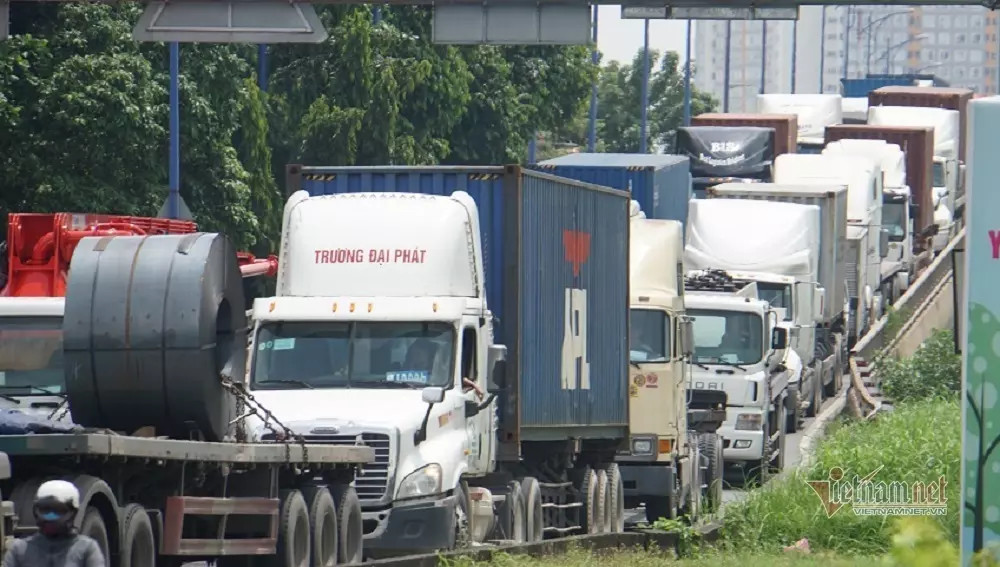
When talking with developers of industrial zones (IZs), many foreign investors say they do not prefer high incentives but good transport infrastructure, which helps to cut costs.
Phan Van Chinh, deputy general director of IDICO, spoke about the issue at the Industrial Real Estate Forum 2022 held by VIR some days ago.
According to Chinh, logistics costs affect enterprises’ operation efficiency. Foreign investors want good infrastructure because this helps reduce logistics costs, thus helping increase profits. And this has more significance than tax incentives.
The lack of synchronization in infrastructure connectivity between localities, increasing logistics costs, is one of the minus points of Vietnam’s investment environment.
According to Trang Bui, CEO of Cushman & Wakefield Vietnam, foreigners know that transport infrastructure projects in Vietnam go slowly. When investors are introduced to A or B infrastructure projects scheduled to be completed by 2025, they say such projects in Vietnam are usually 3-5 years late.
Trang said Vietnam spends 5.8 percent on infrastructure development, but most projects are behind schedule. Logistics costs in Vietnam are among the highest in Asia.
In addition to the problem of logistics costs, Nguyen Cong Ai, deputy CEO of KPMG Vietnam, pointed out that it is necessary to remove bottlenecks in investment procedures in order to speed up project implementation.
A report said that as of early 2020, Vietnam had 335 IZs with the total area of 100,000 hectares, of which 260 IZs had become operational with the occupancy rate of 75.7 percent. As of early 2022, the country had 291 out of 395 operational IZs with an occupancy rate of 70.9 percent.
As such, despite difficulties caused by the pandemic, Vietnam still had 60 more IZs in the last two years and 31 IZs had become operational. Industrial real estate is benefiting in the context of Vietnam becoming an essential link in the global supply chain.
The last two years witnessed many foreign invested projects with large capital pouring into Vietnam, including LNG Power Long An I&II, capitalized at $3.1 billion, LG Display Hai Phong ($2.15 billion), Polytex Far Eastern Binh Duong ($.137 billion), O Mon II Can Tho thermal power ($1.31 billion) and Lego’s project ($1 billion).
Somhatai Panichewa, CEO of Amata Vietnam, said it’s necessary to remove the bottlenecks in logistics.
Japan is a country with cheap transport costs thanks to high-speed transport. Japanese rarely use road transport, but mostly use railways. One tractor can carry a train with many containers of goods at very low costs. Bulk transport depends on railways.
Some products, such as electronic parts, are preferred to be transported by air, but the connections in Vietnam are bad, with low speed and traffic congestion, which makes it impossible to move quickly from IZs to airports.
Vietnam needs to improve transport connections between manufacturing centers and ports. Using railways is advisable.
Amata’s CEO said the foreign direct investment (FDI) inflow into Vietnam is very strong, and Vietnam needs to tidy up its house to receive guests who are the investors.
“Tidying up’ here means clarifying laws and legal framework. The central government needs to instruct local authorities about the laws, so there is consistency in law interpretation at different government levels. Consistency is a very important thing to attract foreign cash flow.”
Pham Hong Diep, Chair of Shinec, the developer of Nam Cau Kien IZ in Hai Phong City, wants state management agencies to properly differentiate housing real estate and industrial real estate, because the latter is associated with infrastructure, such as highways and transport. The investment in industrial zones helps develop local economy.
He hopes that the decisions of the National Assembly would come out quickly, integrated with the laws such as the Laws on Investment, Planning, and Environment, so as to help industrial real estate developers implement projects quickly.
The long time for procedures to get projects licensed will make it slow to provide premises to foreign investors who look for locations for their production activities.
Tran Chung